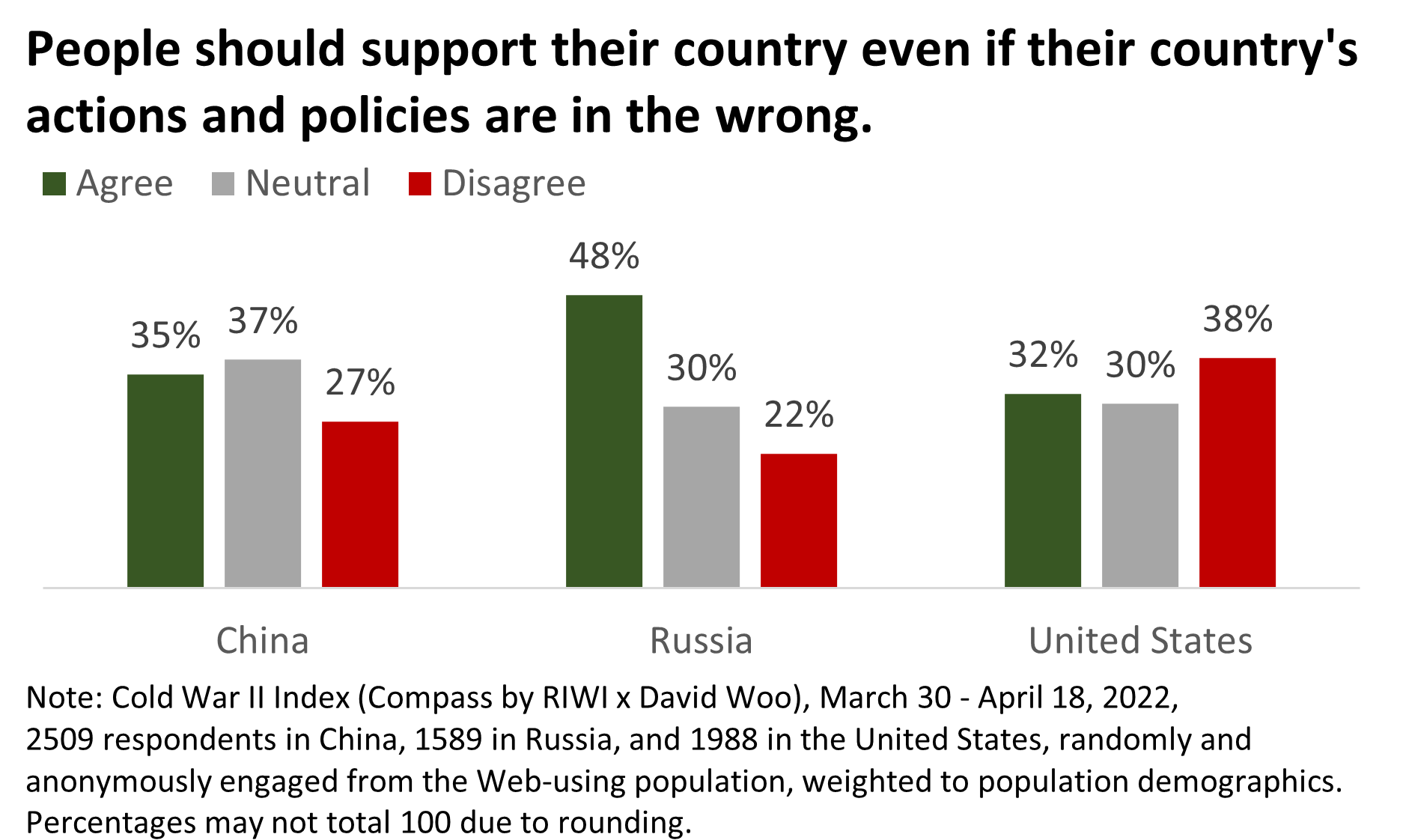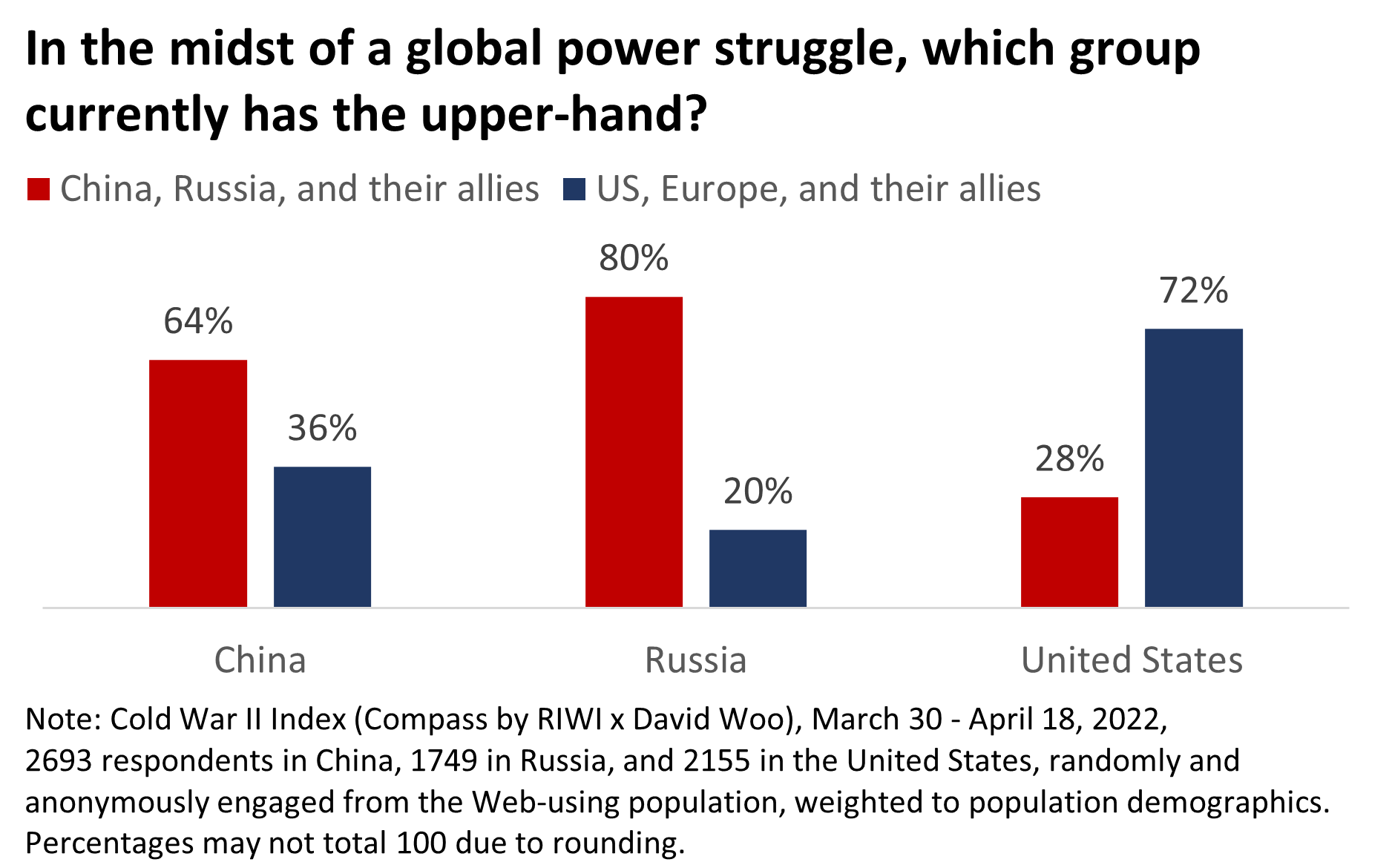David Woo, Rikki H. Sargent, and Danielle Goldfarb
April 21, 2022
- Forty-eight percent of Russians agree that “people should support their country even if their country’s actions and policies are in the wrong”, compared with only 32 percent of Americans, according to a new Cold War II study that uses a unique Web-based technology that minimizes bias.
- The same study finds that the majority of both Russians and Americans now view each other’s countries as an enemy or adversary.
- Interestingly, the vast majority of both Russians and Americans believe they have the “upper hand” in the “global power struggle” between Russia and its allies and the US and its allies.
- Both Americans and Russians believe that what is most at stake in this “global power struggle” is the economic growth prospects for their countries.
- These data are highlights from a new Cold War II Index, the first of its kind that collects real-time, anonymous, independent, and broad-based data from Russian, American, and Chinese citizens about their economic conditions and their views on the global geopolitical realignment.
 Forty-eight percent of Russians agree that “people should support their country even if their country’s actions and policies are in the wrong.” Thirty percent neither agree nor disagree with the statement, and only 22 percent disagree. This compares with only 35 percent of Chinese and 32 percent of Americans who are uncritically loyal to their countries.
Forty-eight percent of Russians agree that “people should support their country even if their country’s actions and policies are in the wrong.” Thirty percent neither agree nor disagree with the statement, and only 22 percent disagree. This compares with only 35 percent of Chinese and 32 percent of Americans who are uncritically loyal to their countries.
Data from the same survey also show that more than half of Americans view Russia as an enemy (23%) or as an adversary (33%), while 59 percent of Russians view the US as an enemy (28%) or an adversary (31%).
Interestingly, the vast majority of Russians (80%) and the majority of Chinese (64%) believe that Russia, China and their allies have the “upper hand” in the “global power struggle” between China, Russia, and their its allies and the US and its allies while nearly three out of four Americans (72%) believe the US and its allies have the advantage.
Moreover, according to citizens in the three countries, the conflict between Russia and its allies and the US and its allies is, at its core, not about political systems but about economic outcomes. When asked what would be most threatened if their side were to fall behind in the global power struggle, the number one selected answer in all three countries was “economic growth” (39% of Russians, 35% of Americans, and 37% of Chinese), and the least selected was the country’s political systems (16% of Russians, 19% of Americans, and 15% of Chinese).
The data in this study were collected anonymously and on a 24/7 basis from more than 1300 Russians, more than 1600 Americans, and over 2200 Chinese between March 30 to April 18.
In addition to the data points highlighted above, the study also includes data from all three countries across other public sentiment indicators related to the geopolitical conflict, as well as real-time economic and financial indicators in all three countries. The economic indicators include consumer spending, inflation expectations, jobs, financial confidence, and retail investment. They provide a real-time signal on, for example, the impact of sanctions on Russian lives, the trajectory of the Chinese economy as it battles the Omicron wave, and on the direction of the US economy far in advance of official data.
Typical survey data from China and Russia are widely viewed as unreliable. The information war being waged alongside the military one is making it even more difficult for analysts and decision-makers to reliably gauge current, let alone future economic and political conditions. This ongoing study aims to fill part of this information gap by providing, to our knowledge, the only independent, broad-based, anonymous, real-time data on the realignment underway.
The data in the Cold War II Index draws on a unique technology which minimizes biases associated with typical survey methods. The technology, Random Domain Intercept Technology (RDIT) engages a broad swath of the Web-using populations in Russia, China, and the US on a 24/7 basis. The core concept behind the technology’s algorithms is that anyone surfing the Web has a random chance of exposure to the questions, which results in the inclusion of those who are not typically included in opinion polls. Individuals surfing the Web have a chance of landing on a dormant domain temporarily being managed by RIWI. RIWI then intercepts the Web user and presents them with a RIWI survey. Once exposed, RIWI validates the country of the Web user and delivers an appropriate survey. Also, unlike typical opinion polls in Russia, China, and the US, no identifiable information is collected (e.g., names, email) and no incentives for participation are provided. These security measures/methodological characteristics encourage individuals to respond honestly (avoiding social desirability bias and incentive bias).
Data collection continues on an ongoing basis and Index subscriptions are available here.
The Cold War II Index data include ongoing answers to the following questions:
Geopolitical / political
1. [Russia and US respondents only] In my country, people view the US-Russia [Russia-US] relationship as:
a. Allied: both countries formally cooperate to reach shared goals
b. Cordial: both countries generally approve of one another
c. Co-existing: both countries are generally neutral toward one another
d. Adversarial: both countries are opponents or rivals
e. Enemies: both countries are hostile toward one another
2. [China and Russia respondents only] In my country, people view the China-Russia [Russia-China] relationship as:
a. Allied: both countries formally cooperate to reach shared goals
b. Cordial: both countries generally approve of one another
c. Co-existing: both countries are generally neutral toward one another
d. Adversarial: both countries are opponents or rivals
e. Enemies: both countries are hostile toward one another
3. [US and China respondents only] In my country, people view the China-US [US-China] relationship as:
a. Allied: both countries formally cooperate to reach shared goals
b. Cordial: both countries generally approve of one another
c. Co-existing: both countries are generally neutral toward one another
d. Adversarial: both countries are opponents or rivals
e. Enemies: both countries are hostile toward one another
4. To what extent do you agree or disagree with the following: People should support their country even if their country’s actions and policies are in the wrong.
a. Strongly agree
b. Agree
c. Neither agree nor disagree
d. Disagree
e. Strongly disagree
5. In the midst of a global power struggle, which group currently has the upper-hand?
a. US, Europe, and their allies
b. China, Russia, and their allies
6. If the US, Europe, and their allies [China, Russia, and their allies] were to fall behind in the global power struggle, which of the below would be most threatened?
a. My country’s political system
b. My country’s cultural identity and values
c. My country’s standing in the world
d. My country’s economic growth
Economic
7. Which best describes your overall spending this month compared to the previous month on things like eating out, furniture, electronics, and clothing? My spending has:
a. Increased
b. Decreased
c. Stayed the same
8. Which of these best describes your views about your financial situation?
a. Very optimistic about the future
b. Slightly optimistic about the future
c. Slightly pessimistic about the future
d. Very pessimistic about the future
e. Optimistic about the future
9. Think about the prices of goods and services that your family bought over the past year. A year from now, do you think those prices will be:
a. Much higher
b. Somewhat higher
c. No change
d. Somewhat lower
e. Much lower
10. Which best describes your work status?
a. Working full time
b. Working part time
c. Unemployed / I’ve had job interviews in the past month
d. Unemployed / I’ve actively applied in the past month (e.g., submitted an application, emailed an employer), but have not had an interview
e. Student / retired / not actively looking for work
11. How do you plan to change your level of investment in the stock market over the next month?
a. Invest more
b. Invest the same
c. Invest less
d. I don’t invest in the stock market
12. Which statement best reflects your view on COVID-19 when making decisions about yourself and your family [e.g., travel, work, housing]?
a. COVID is here to stay. We will have to learn to live with it.
b. COVID is temporary. Life will or has already returned to a preCOVID normal.
The Index also includes demographic data, such as auto-detected data on region, city, respondent device, operating system and version, and self-reported data on age, gender, household income, education level, marital status, and living region.
For media requests or to book a presentation on the latest Index results please contact compass@riwi.com.